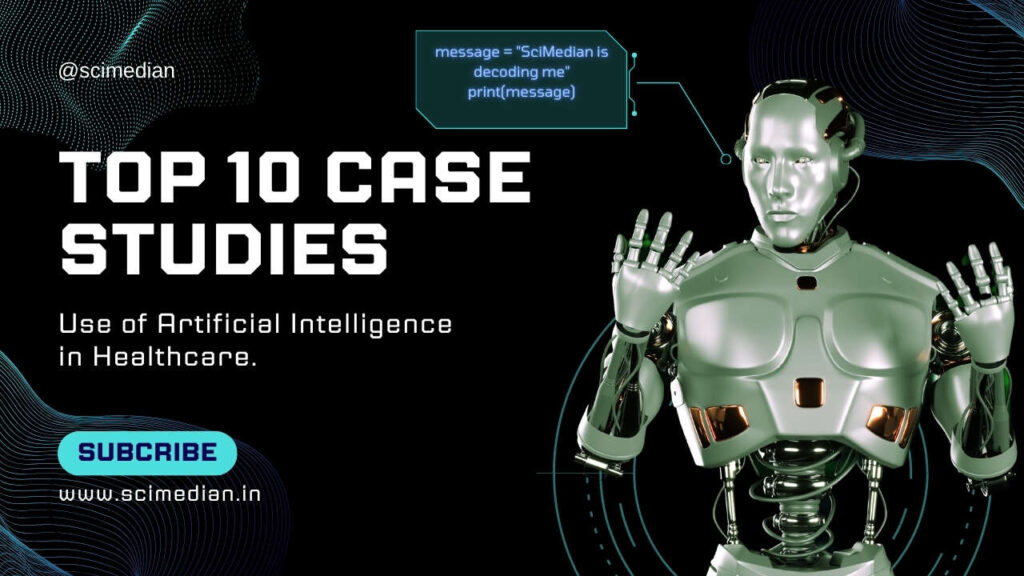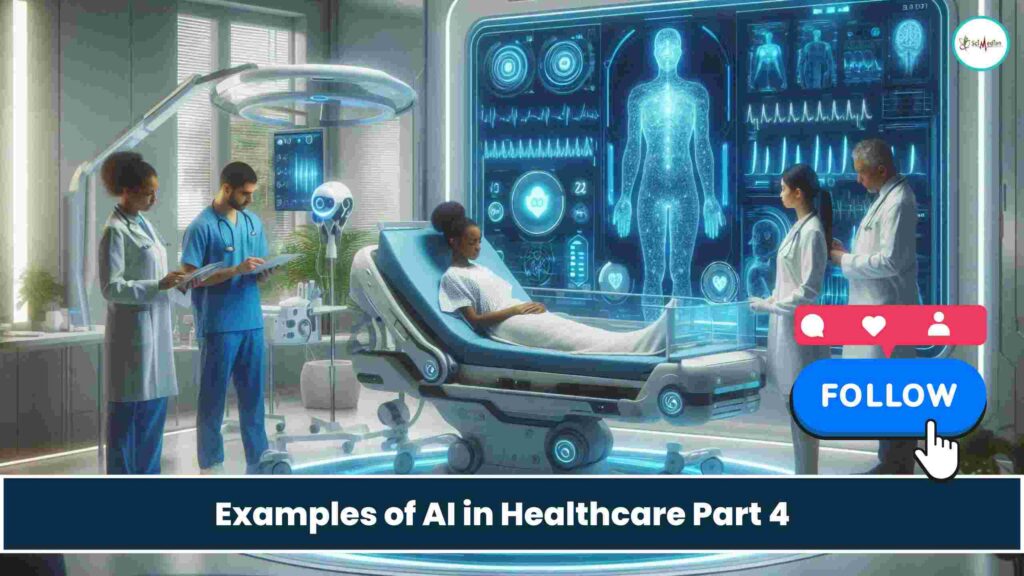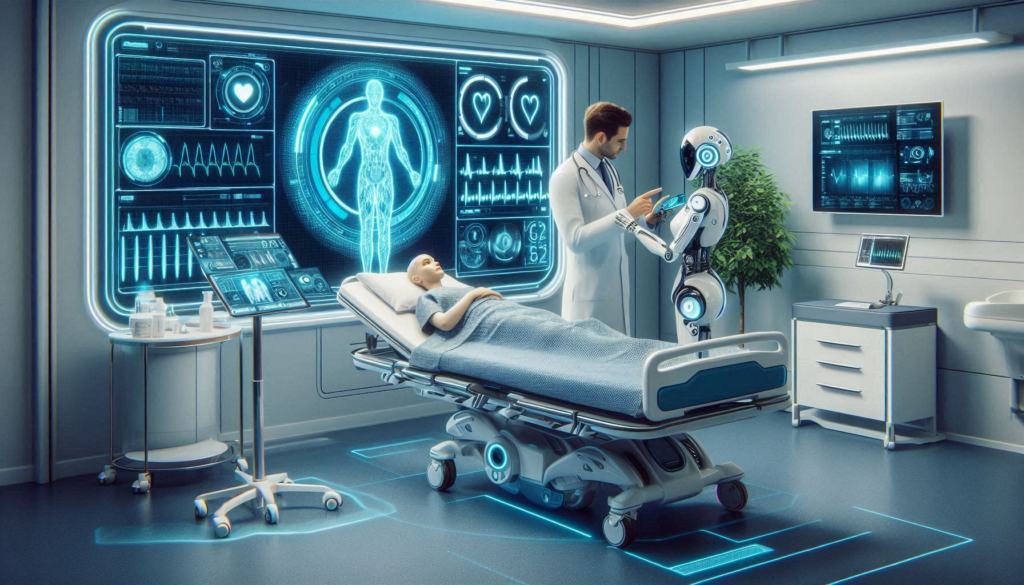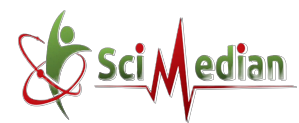Top 5 Examples of AI in Healthcare- By SciMedian [Part 3]
Previous 2 blogs Part1, Part 2
Blog Introduction
In the rapidly evolving landscape of healthcare, technological advancements are revolutionizing the way we diagnose, treat, and manage diseases. From the precision of disease diagnosis to the tailored approaches of personalized medicine, and the supportive roles of virtual health assistants, the integration of innovative tools is transforming patient care. Wearable devices and remote monitoring are empowering individuals to take charge of their health, while streamlined administrative tasks are enhancing the efficiency of healthcare systems. This blog delves into these cutting-edge developments, highlighting how they are shaping the future of healthcare
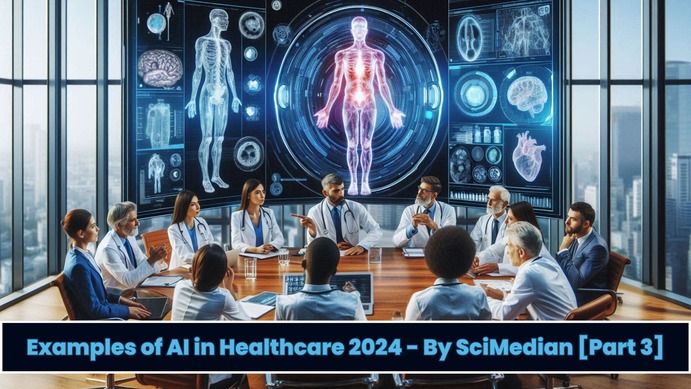
Disease diagnosis
Is a critical aspect of healthcare, enabling timely treatment and management. Here are some examples of common medical diagnoses:
- Alzheimer’s Disease:
- The most common form of dementia, characterized by memory loss and impaired day-to-day function.
- Arrhythmia:
- An irregular heartbeat that affects the heart’s ability to pump blood efficiently.
- Arthritis:
- Inflammation of muscles and joints, leading to pain, stiffness, and reduced mobility.
- Chronic Kidney Disease (CKD):
- Progressive damage to the kidneys, affecting their ability to filter waste and maintain fluid balance.
- Diabetes:
- A metabolic disorder characterized by high blood sugar levels due to insufficient insulin production or resistance.
Personalized medicine
Personalized medicine also known as precision medicine or individualized medicine, is a field of healthcare that tailors disease prevention, diagnosis, and treatment to individual patients based on their genetic and genomic information. Here are some examples of personalized medicine applications:
- Targeted Cancer Therapies:
- Oncologists use tumor molecular profiling to identify specific mutations driving cancer growth. Based on this information, they prescribe targeted therapies that address the unique genetic characteristics of each patient’s tumor.
- Pharmacogenomic-Guided Medication Selection and Dosing:
- Genetic variations influence how individuals respond to drugs. Personalized medicine helps determine the most effective medications and optimal dosages for each patient.
- Cardiovascular Risk Assessment:
- Genetic and biomarker data assist in assessing an individual’s risk of cardiovascular diseases. This information guides preventive measures and personalized treatment plans.
- Personalized Vaccination Strategies:
- Genetic factors influence vaccine responses. Personalized medicine helps tailor vaccination schedules and strategies based on an individual’s immune profile.
- Genetic Testing for Neurodegenerative Disorders:
- Assessing an individual’s genetic risk for conditions like Alzheimer’s disease informs early interventions and personalized care.
Virtual Health Assistants (VHAs)
VHAs are AI-driven platforms designed to aid individuals in managing their health and navigating the complexities of the healthcare system. These digital companions offer personalized support and serve as a bridge between health professionals and patients. Here are some examples of how VHAs are transforming healthcare:
- Symptom Interpretation and Triage:
- VHAs help users understand their symptoms, assess their severity, and recommend appropriate next steps (e.g., seeking urgent care or scheduling a doctor’s appointment).
- Example: A VHA guiding a user through chest pain symptoms and advising whether it requires immediate attention.
- Appointment Scheduling and Reminders:
- VHAs assist in booking medical appointments, reminding patients of upcoming visits, and managing their healthcare calendar.
- Example: A VHA scheduling a follow-up visit for a diabetic patient with their endocrinologist.
- Medication Management:
- VHAs provide reminders to take medications, track adherence, and offer information about drug interactions.
- Example: A VHA reminding a user to take their daily blood pressure medication.
- Health Education and Information:
- VHAs offer personalized health advice, answer medical queries, and provide context-specific information.
- Example: A VHA explaining the benefits of exercise for managing hypertension.
- Post-Treatment Follow-up:
- VHAs engage with patients after hospital discharge, monitoring recovery progress and addressing any concerns.
Example: A VHA checking in on a post-surgery patient and assessing wound healing.
Wearable devices and remote monitoring
Wearable devices play a crucial role in modern healthcare, empowering patients and healthcare providers alike. Here are some examples of how wearable devices contribute to remote monitoring:
- Fitness Trackers and Smartwatches:
- Devices like Fitbits and Apple Watches monitor daily activity, heart rate, and sleep patterns. They provide valuable data for health assessment and encourage physical activity.
- Glucose Monitors:
- Wearable continuous glucose monitors (CGMs) track blood sugar levels in real time. They help individuals with diabetes manage their condition and adjust insulin doses accordingly.
- Blood Pressure Monitors:
- Wearable blood pressure cuffs allow patients to measure their blood pressure at home. The data can be shared with healthcare providers for better hypertension management.
- Pulse Oximeters:
- These small devices clip onto a finger and measure oxygen saturation levels. They are useful for monitoring respiratory health, especially in patients with lung conditions.
- ECG Monitors:
- Wearable electrocardiogram (ECG) devices, such as the Apple Watch, detect irregular heart rhythms. They provide early warnings for conditions like atrial fibrillation.
- Skin Patches:
- Skin-worn patches collect data on vital signs, hydration levels, and even sweat composition. They offer continuous monitoring without the need for frequent check-ins.
- Maternity Care Trackers:
- Wearable devices for pregnant women monitor fetal heart rate, contractions, and maternal health. They enhance prenatal care and early detection of complications.
Administrative tasks
Administrative tasks are essential for maintaining efficient office operations. These responsibilities vary across industries and roles but are crucial for supporting productivity and organization. Here are some common administrative duties with examples:
- Filing and Data Management:
- Organizing documents in filing cabinets or digital systems.
- Maintaining accurate records of company research, customer information, and financial data.
- Research and Information Gathering:
- Collecting data online or from various sources.
- Analyzing information to make informed decisions and address issues effectively.
- Phone Call Handling:
- Answering and transferring phone calls.
- Providing information to callers about the organization.
- Scheduling and Calendar Management:
- Booking appointments and coordinating meetings.
- Managing calendars to ensure efficient time utilization.
- Email Management:
- Handling email inquiries and responding promptly.
- Organizing and prioritizing incoming messages.
- Office Supplies and Inventory Control:
- Procuring and managing office supplies.
- Ensuring availability of necessary tools and materials.
- Document Creation and Communication:
- Drafting written communication (emails, memos, reports).
- Maintaining effective communication within the organization.
- Visitor Reception and Hospitality:
- Welcoming and assisting guests.
- Creating a positive first impression for visitors.
- Change Management and Process Improvement:
- Handling change requests and updates.
- Contributing to streamlining processes and improving efficiency.
Thank you
- DNA sequencing Overview, Process, and Sequences
- Whole exome sequencing Results, Diseases Detection, and clinical exome sequencing
- Whole exome sequencing Cost, Importance, and time
- What is Whole Exome Sequencing in 2025 in 2 minutes
- 10 Case Studies of Successful Implementation of AI in Healthcare By SciMedian.
- Top 5 Examples of AI in Healthcare- By SciMedian [Part 4]




